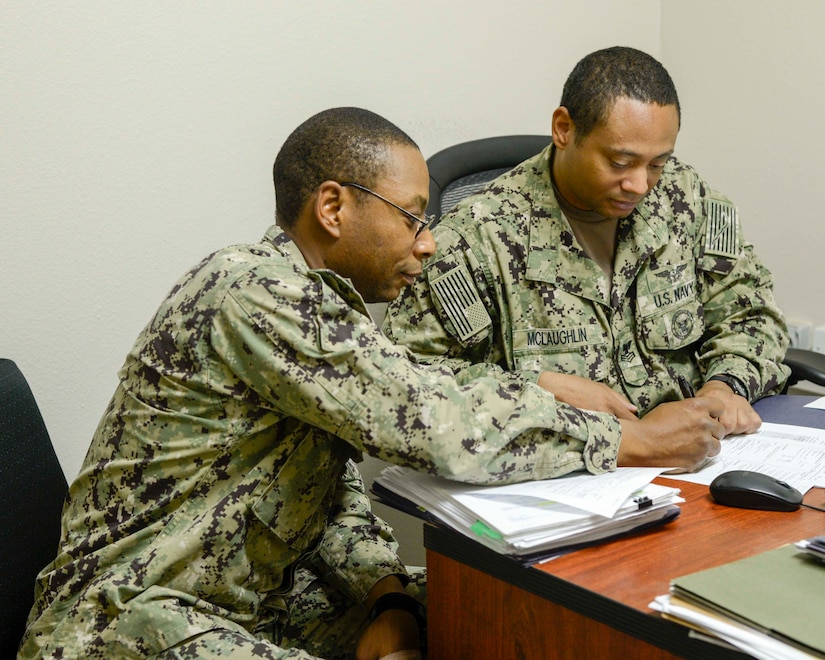By Navy Petty Officer 1st Class Joseph Rullo, Camp Lemonnier
CAMP LEMONNIER, Djibouti -- The Navy Reserve is a convenient
way for some sailors to serve on a part-time basis. The one-weekend-a-month,
two-weeks-a-year schedule allows sailors leaving active duty to continue their
service and, possibly, reach retirement.
Occasionally, circumstances change, and a return to active
duty becomes an attractive option.
Petty Officer 1st Class Jason Judson, a logistics specialist
in the Navy Reserve, said he is interested in going back to active duty to
finish his Navy career. “It’s always been one of my goals; to retire from the
Navy after 20 years of service,” he said. “While I’m close to retiring from the
Navy Reserve side, I’d much prefer to retire from active duty.”
Judson left active duty as part of the Perform to Serve
Program in 2012.
RC2AC
Reservists interested in returning to active duty have an
opportunity to do so through a program called Reserve Component to Active
Component Augmentation, or RC2AC.
The program is used to fill empty positions in the active
duty Navy by using existing skill sets from Reserve sailors to help improve and
maintain the health of the force.
A strictly voluntary program, RC2AC must be initiated by the
appropriate enlisted community manager in response to a specific need. Judson
said he was familiar with the program and its requirements before he applied.
“The program is something I’ve followed on and off for the
past six years,” he said. “I was waiting for my year group to open up.” A year
group is the fiscal year in which an adjusted active duty service date falls.
Sailors can work with their command career counselor to calculate their
adjusted ADSD and year group.
Sailors interested in applying to the RC2AC program must
meet some basic physical, medical, rating, tenure and year group criteria.
Navy Petty Officer 1st Class James McLaughlin, a command
career counselor here, said that he is working with three mobilized sailors who
have applied for the RC to AC program and notes that regulations limit when
mobilized sailors may apply.
“Because [these] sailors are mobilized, I cannot submit
their packages until they are 90 days from redeployment,” McLaughlin said. “I
submit a copy of their deployment orders so that the enlisted community manager
can see that they are redeploying at a certain date.”
If selected, sailors must work with their active community
detailers to find an appropriate billet. The detailer will contact the sailor
to negotiate assignment possibilities.
Considerations
There are some other considerations when applying for the
RC2AC program. Sailors will be subject to active advancement quotas as well as
their sea-shore flow policy.
McLaughlin said that the Navy is looking to fill seagoing
rates such as boatswain’s mates and operational specialists through the
program. “If a sailor really wants to go active, they can look at one of these
[seagoing] rates,” McLaughlin said. “The Navy is trying to get the manning
where they need it.”
Additionally, active duty sailors are not eligible for
re-enlistment bonuses upon augmentation.
Individuals who may have been discharged for high year of
tenure and have made rank in the reserves may consider RC2AC as a way to
continue their active Navy career.
McLaughlin said the program has been popular here. “We have
a tremendous success rate here,” he said. “Out of the 20 or so people who
applied, 14 were selected.”
Judson said he has applied for an active duty assignment in
his current rate of logistics specialist and expects that he will receive an
answer by July 20. Although he may reapply if not selected, he said, he is
hoping to be successful at his bid to return to active duty and retire.
“I’m nervous,” he said. “It’s that one opportunity to win or
lose, so I’m taking my chances on this one and hope to be accepted.”









No comments:
Post a Comment